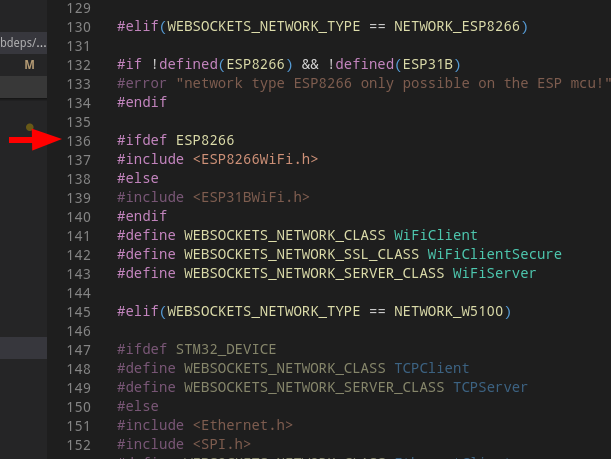Hi all,
I’ve been scouring the forums and Google trying to figure this out for about 2 days. I’m relatively new to everything, so forgive me if I am missing something. I’ve had some issues in my primary project, so I created a new workspace to test things out. It’s still giving me the same error: ESP8266WiFi.h: No such file or directory. The issue has something to do with switching lib_ldf_mode to deep+, which is something I am experimenting with in my primary project.
Here is my main.cpp:
#include <Arduino.h>
#include <ESP8266WiFi.h>
#include "WebSocketsServer.h"
void setup() {
// put your setup code here, to run once:
}
void loop() {
// put your main code here, to run repeatedly:
}
Here is my platformio.ini:
[env]
lib_ldf_mode = deep+
[env:nodemcuv2]
platform = espressif8266
board = nodemcuv2
framework = arduino
lib_deps = 549
And here is the build output:
Verbose mode can be enabled via `-v, --verbose` option
CONFIGURATION: https://docs.platformio.org/page/boards/espressif8266/nodemcuv2.html
PLATFORM: Espressif 8266 2.2.2 > NodeMCU 1.0 (ESP-12E Module)
HARDWARE: ESP8266 80MHz, 80KB RAM, 4MB Flash
PACKAGES: toolchain-xtensa 2.40802.190218 (4.8.2), framework-arduinoespressif8266 2.20502.0 (2.5.2), tool-esptool 1.413.0 (4.13), tool-esptoolpy 1.20600.0 (2.6.0)
LDF: Library Dependency Finder -> http://bit.ly/configure-pio-ldf
LDF Modes: Finder ~ deep+, Compatibility ~ soft
Found 30 compatible libraries
Scanning dependencies...
Dependency Graph
|-- <WebSockets> 2.2.0
| |-- <Hash> 1.0
|-- <ESP8266WiFi> 1.0
Compiling .pio\build\nodemcuv2\lib2e7\WebSockets_ID549\SocketIOclient.cpp.o
Compiling .pio\build\nodemcuv2\lib2e7\WebSockets_ID549\WebSockets.cpp.o
Compiling .pio\build\nodemcuv2\lib2e7\WebSockets_ID549\WebSocketsClient.cpp.o
Compiling .pio\build\nodemcuv2\lib2e7\WebSockets_ID549\WebSocketsServer.cpp.o
In file included from .pio\libdeps\nodemcuv2\WebSockets_ID549\src\WebSocketsClient.cpp:25:0:
.pio\libdeps\nodemcuv2\WebSockets_ID549\src\WebSockets.h:137:25: fatal error: ESP8266WiFi.h: No such file or directory
I don’t really understand the problem, but I thought I would put it out there in case anyone else has a similar issue or wants to look into it. Thanks in advance for any input.
Tyler
